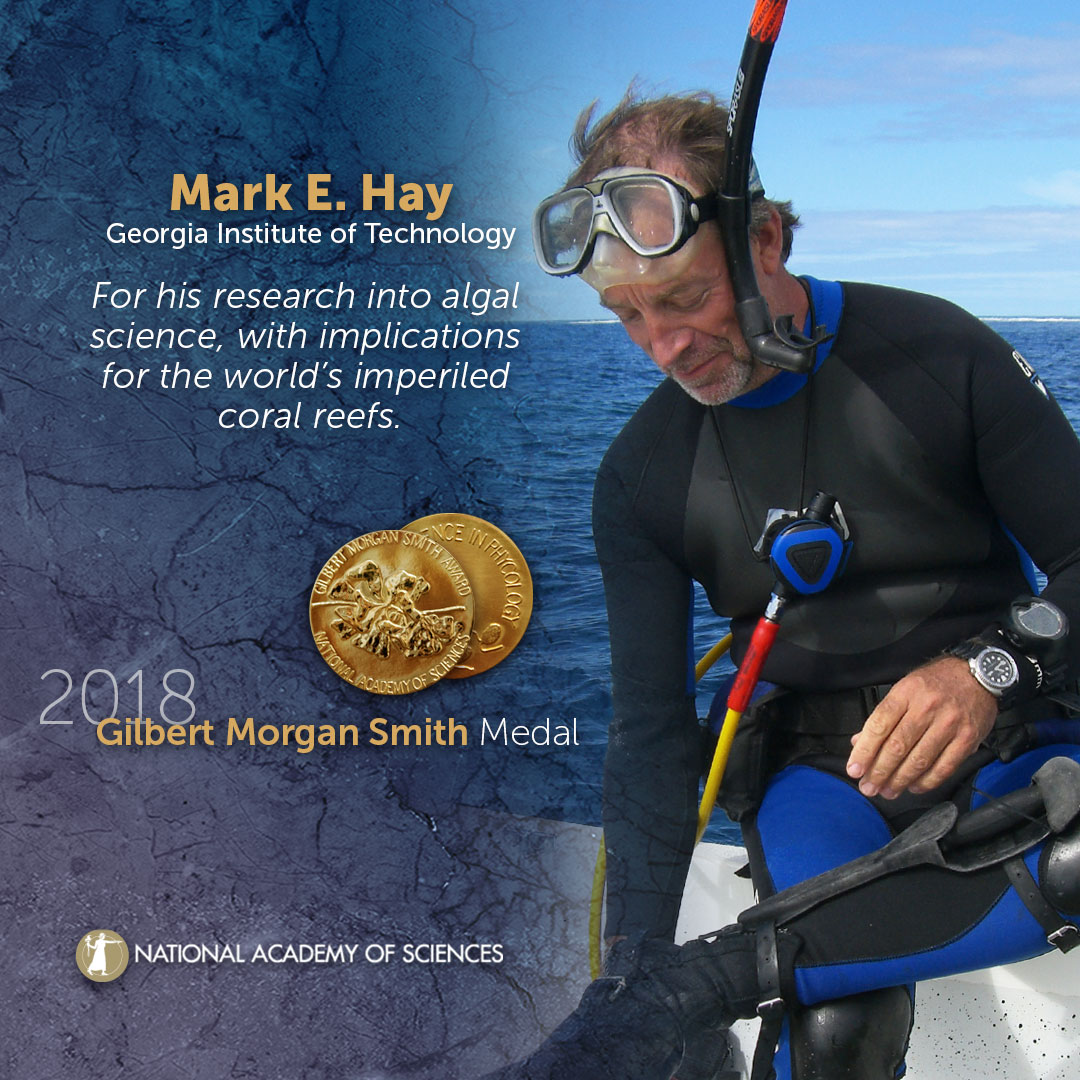Mark E. Hay, Regents Professor and Harry and Linda Teasley Chair in the School of Biological Sciences at Georgia Tech, is the recipient of the 2018 Gilbert Morgan Smith Medal of the National Academy of Sciences. The award recognizes excellence in published research on marine and freshwater algae.
The 2018 Smith Medal recognizes Hay’s research into algal science, which has influenced a generation of scientists and revealed numerous insights into the declining health of ocean ecosystems. His research has enormous implications for coral reef recovery, along with the ecosystems and human societies that depend upon these reefs.
Hay developed algal chemical ecology as the major model for marine chemical ecology, a field that he cofounded. He elucidated how chemical cues and signals from algae structure marine and aquatic populations, communities, and ecosystems.
An experimental ecologist, Hay led scientific expeditions to remote regions to study the processes and mechanisms that control the organization, function, and sustainability of natural ecosystems. His studies of seaweed – which comprise red, brown, and green marine algae – have revolutionized the practice of marine conservation and management.
“By conducting phycological studies within the broader intellectual framework of ecology and evolution, Mark extended the impact of his algal studies,” says James H. Tumlinson, the Ralph O. Mumma Professor of Entomology and Director of the Center for Chemical Ecology at Pennsylvania State University. “His research has informed the conservation of coral reefs and helped predict how coastal ecosystems will be altered by global change.”
Hay’s 40-year academic career features many discoveries about the natural history of seaweeds. Initially, he focused on the effects of physical factors and biotic interactions on algal ecology, Tumlinson says. Then Hay turned to seaweed-herbivore interactions, seaweed chemical defenses, and the roles they played in deterring herbivores, overcoming competitors, and organizing seaweed communities.
Insights from his research enabled Hay to predict that particular combinations of herbivores would be needed to stop seaweed damage to corals and the algal domination of reefs. “By manipulating herbivore diversity alone, Hay’s lab was able to prevent coral mortality and increase coral growth, thus demonstrating the applied potential of his research,” Tumlinson says. “More recent work demonstrates the critical role of algal chemical cues in fish and coral recruitment on Pacific reefs and the impact of these chemical cues on reef resilience.”
“His research has informed the conservation of coral reefs and helped predict how coastal ecosystems will be altered by global change.”
The Smith Medal is the latest of significant honors bestowed upon Hay. In 2016, Hay reaped three awards: He received the International Society of Chemical Ecology (ICSE) Silver Medal, the society’s highest honor. He was named Fellow of the Ecological Society of America. And Georgia Tech named Hay the recipient of the 2016 Outstanding Faculty Research Author Award, for producing the most impactful publications from Georgia Tech in the previous five years.
“We bask in the glow of Mark’s accomplishment,” says College of Sciences Dean and Sutherland Chair Paul M. Goldbart. “Through his research and education efforts, Mark serves as a role model inspiring countless students and colleagues. In his communication efforts, Mark sets a superb example that so many more of us need to emulate.”
Indeed, Hay’s outstanding scholarship is matched by his zeal in communicating his research and its ecological implications in ways that are understandable to the public. He has written articles for the New York Time’s Scientists At Work blog and given numerous interviews to broadcast media, including NPR, BBC, CBS, ABC, Voice of America, and Voice of Russia.
“Because the ecosystem I study is disappearing,” Hay says, “I’ve perceived the need to focus on senior decision makers that can make a difference in the very near term.” Lately, he has been speaking about environmental challenges at corporations like The Coca-Cola Company and at community organizations, such as Rotary Clubs. He continues to educate the world about the plight of endangered ecosystems by organizing international symposia and web-based global discussions.
Presented every three years, the Smith Medal consists of a gold-plated bronze medal and a $50,000 prize. The bequest of Helen P. Smith in memory of her husband, Gilbert Morgan Smith, established the award in March 1968. Gilbert Smith was a renowned botanist, a member of the National Academy of Sciences, and the first president of the Phycological Society of America.
For More Information Contact
A. Maureen Rouhi, Ph.D.
Director of Communications
College of Sciences




